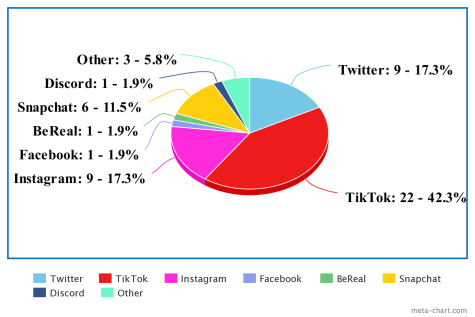
Grace is a sophomore, and this is her second year writing for NA Eye. She's fascinated by Mars, astrobiology, and space travel.
March 29, 2023
“I believe that the ability to completely edit and filter yourself makes an unreal standard of what people should look like. The amount of likes you have on a photo dictates how you feel about it, and comments are basically a way to anonymously hate on people and put them down. I’ve seen many friendships be ruined not only by the things said or shown on social media, but the time spent on it. People would rather snap each other, or make a video together than actually speak to one another. It’s come to the point where if you don’t use social media you’re left out, and not a part of what the world is becoming.”
Across the past few decades, the capabilities of technology have increased tenfold. As the power of social media rises, some questions have risen too–is social media really that harmful? Which platform causes the most harm? And perhaps most importantly, is all of this really worth it? Despite the fact that social media is proven to have the strongest effects on the teenage age group, the voices of older generations are typically the ones most heard when speaking on the issue. Over 50 NAI students shared their own opinions on the pros and cons of social media.
While all apps have their own detrimental effects, some have proven to be much more harmful to mental health than others. When surveyed, 42.3% of all students interviewed stated that TikTok was the most harmful towards their own mental health.

When asked why, three different effects were brought up the most often: an addictive algorithm that disrupts sleep patterns, popular creators setting extremely unrealistic beauty standards, and the rapid spread of harmful misinformation through viral short videos.
“I believe that TikTok is the most detrimental because it can be very addicting. Also along with the other apps, everything you put on there you can’t delete. It will always be there. Even though TikTok is a fun app that you can use with friends, it can also be very harmful because of addiction and the ability to not delete things permanently.”
“I feel like most people are on TikTok, and I know I have seen people commenting negative things about people on it. People post so many fake things on it which cause people to become scared. Another fake thing people post is their bodies. Now not all people who do that are fake, but it causes other people to compare themselves, making them more depressed and it causes a negative ‘beauty standard’.”
“TikTok is the most harmful social media platform because cyberbullying is a high ‘trend’ in comments, Tiktok DMs, and just the videos in general. It also is very addicting and watching for hours and hours can lead to such things as procrastination, sleep deprivation, and feeling fatigue.”
With 17.3% of total votes each, Instagram and Twitter tied for second place. Students who chose Twitter most commonly spoke of the normalization of toxic posts across the website, frequently targeting other users. Twitter’s algorithm, programmed to present frequently interacted with posts across communities (usually arguments) constantly exposes users to hateful speech.
“People are extremely harsh and vicious on Twitter and often share disgusting and plain wrong takes that can damage others and sometimes people are targeted even when they go through hard times. They’re keyboard warriors, and if they were given the chance to tell the person they’re attacking in person, they’d be too scared to do it, and would opt not to.”
“Twitter has the most mainstream collection of people that uses an algorithm that relies on your emotional response, good or bad. A negative reaction, however, is a much stronger emotion which pushes engagement, what it checks for. It promotes these materials because they get a lot of attention rather than their quality.”
Instagram was talked about for the negative ways influencers and the algorithm impact users’ body image. The common usage of filters and photoshop to enhance body traits to an unrealistic level can be incredibly harmful. Some surveyed talked about their individual struggles not tying their self worth to Instagram’s ability to like posts. Oftentimes, they feel pressured to constantly appear the way they do in their most liked posts and constantly live up to the image they created for themselves across the app. Instagram also largely contributes to an increased fear of missing out, according to students. When every outing is posted, students recall feeling like they must change their lives to live up to the highlights of the other lives of their own classmates. Tagging, a feature in which users can link the profiles of people who appear in their posted pictures, can cause feelings of exclusion and isolation.
“Instagram gives a false appearance of life because people only share their best moments, and have the ability to edit them so that they are not reality, they are simply a fantasy. thus giving people false hopes because they will try to be more like the people they are seeing on there even though it’s fake.”
“I feel that FOMO is definitely a big part of how this app gets people so addicted to it, because everyone’s like, ‘Oh, my friends are up to this and that, why didn’t I get tagged/invited? Why am I not in their posts?’ Like, sometimes I just start scrolling through my friends’ posts and feeling more and more left out, and then I scroll more, in order to know what else I was left out of. It’s kind of like a vicious cycle that takes advantage of humans’ weaknesses, fear of being not necessarily alone, but lonely and left out.”

Grace is a sophomore, and this is her second year writing for NA Eye. She's fascinated by Mars, astrobiology, and space travel.